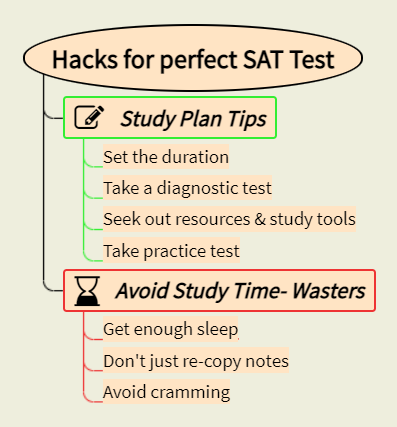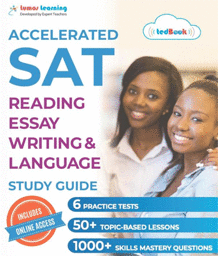If you have the SAT coming up, it’s likely you’ve at least started thinking about a study plan. We know it can be daunting, but creating an efficient, effective study plan doesn’t have to be difficult. When it comes to maximizing your revision, it’s important to set up a study plan while avoiding common time-wasters. Here are 7 top tips for creating the perfect SAT for you:
Study Plan Tips
1. Set the duration
Is your SAT in 6 months, 3 months, or 1 month? The amount of time you have to revise will make a big impact on what your study plan looks like. Of course, the earlier you start prepping the better, but anything you study 6 months out will still need to be refreshed closer to test day (our brains have a sneaky habit of forgetting things!)
2. Take a diagnostic test
Understanding your weaknesses (and strengths! ) is an important step in knowing what area to focus your study on. Taking a diagnostic test, like the one available at Lumos Learning, will give you a clear indication of your current level, and what areas need extra attention in your revision plan.
3. Seek out resources and study tools
You are not in this alone, that’s for sure! There are many resources available online to take the guesswork out of SAT prep. The StepUp program from Lumos Learning breaks study into manageable chunks, with proven methods to help that info stick.
4. Take practice tests
To fully prepare for the SAT, taking full practice tests is crucial. This way, you will get used to working under pressure and a time limit, and become familiar with specific question styles. Practice tests don’t have to come at the end of your study plan, either. Spread them throughout your revision and use them to constantly review your progress.
Avoid Study Time-Wasters
5. Get enough sleep
While it may feel efficient to stay up all night, those extra hours won’t necessarily result in better results. You are human, after all, and your brain thrives on being looked after. Creating (and sticking to!) a sleep schedule is a proven way to help yourself out.
6. Don’t just re-copy notes
When students are preparing for the SAT, it can be tempting to copy down your study material over and over in the hopes that it will stick in your memory. Unfortunately, this is not a very effective study technique and is ultimately a waste of time. Other techniques like practice questions or creating flashcards are much better at creating lasting memory pathways in your brain.
7. Avoid cramming
Cramming can be a result of either not preparing enough for your SAT, or not trusting the preparation that you have done. Either way, cramming in the week or even the night before the test is not going to effectively boost your result the way you might hope. Yes, it is important to revise your notes, but not in the desperate way that cramming implies.



